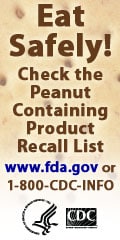FDA had found E. coli in a sample of the cookie dough, following reports that people had become sick after eating the product. Although DNA tests showed that the type of E. coli found in the sample was not the same type of E. coli found in the people who became ill, FDA’s and CDC’s advice remains the same: consumers should not eat the recalled Nestlé Toll House refrigerated cookie dough.
However, after a plant shutdown, an investigation, and a cleanup, Nestlé is now using main ingredients from new suppliers and is making the cookie dough again. These newly made products are not part of the ongoing recall and are not associated with any illness outbreaks or known contamination.
Consumers can identify the newly made products by looking for labels with shields that say “new batch” on them; these batches are not part of the current recall.
FDA and CDC also continue to warn consumers against eating any raw dough for cookies or other baked goods, at any time, because of potential contamination with Salmonella or E. coli bacteria.
As of July 10, 2009, CDC reported that 76 people from 31 states have been infected with the outbreak strain of E. coli O157:H7. As of that date, 35 people had been hospitalized, including 11 with a serious complication called hemolytic uremic syndrome. No one has died.
Which Products Can Consumers Eat?
Consumers can eat baked cookies made from Nestlé Toll House cookie dough that has not been recalled. Products that carry new labeling with a shield that says "new batch" are not part of the current recall.
Which Products Should Not Be Eaten?
FDA and CDC continue to warn consumers not to eat any varieties of the recalled Nestlé Toll House cookie dough. This includes Nestlé Toll House cookie dough that does not say "new batch" on the labeling. These products should be thrown away. Contact your health care professional immediately if you or your family have recently eaten recalled cookie dough and have had stomach cramps, vomiting, or diarrhea, with or without bloody stools.
Follow Safe Food-Handling Practices
- Do not eat any raw cookie dough or any raw food product that’s supposed to be cooked or baked.
- Follow package directions for cooking at proper temperatures and for specified times.
- Wash hands, work surfaces, and utensils thoroughly after contact with raw products.
- Keep raw foods separate from other foods while preparing them to prevent any contamination that might be present from spreading.
- Chill products promptly after purchase and after using them, if they require refrigeration.
About E. coli O157:H7
The bacteria cause stomach cramping, vomiting, and diarrhea, often with bloody stools.
E. coli O157:H7 can cause serious illness or death in anyone, of any age, but most healthy adults recover completely within a week.
Young children and the elderly are at highest risk for developing hemolytic uremic syndrome, which can lead to serious kidney damage and death.





